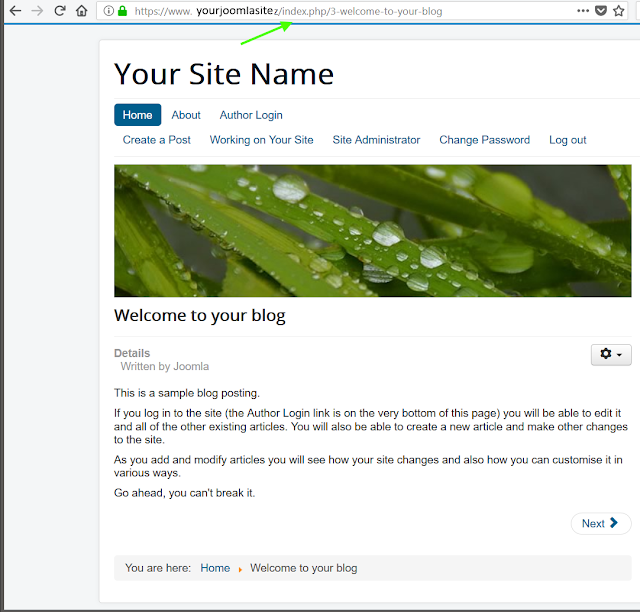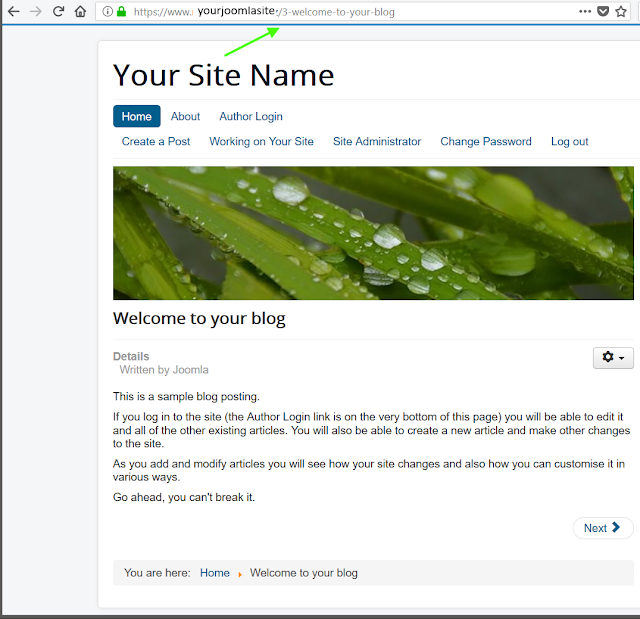Joomla! is a free and open-source content management system (CMS) for publishing web content. It is built on a model–view–controller web application framework that can be used independently of the CMS that allows you to build powerful online applications.
After installing Joomla you may notice your links have index.php within the url.
While functional, for Search Engine Friendly URLs, it is recommend to remove script names
To remove index.php from urls, login to the Joomla administration section
https://www.yourjoomlasite.com/administrator/
Select System
Select Global Configuration
Search Friendly URLs should already be enabled
Enable Use URL Rewriting
URL rewriting is a way of implementing URL mapping or routing within a web application. Rewritten URLs (sometimes known as short, pretty or fancy URLs, search engine friendly - SEF URLs, or slugs) are used to provide shorter and more relevant-looking links to web pages. The technique adds a layer of abstraction between the files used to generate a web page and the URL that is presented to the outside world.
Click Save
View your blog post again,
It may work, but most likely you will get a 404
You now need to tell the web server what to URL Rewrite
If you are using Apache as your web server, conveniently, Joomla comes with rules already written, you just need to enable them.
In the Joomla web directory, there should be a file named htaccess.txt
Rename that file to .htaccess
mv htaccess.txt .htaccess
In Linux,
mv moves a file to another file, thus renaming it.
ls -l shows detailed listing of fies
ls -al also show 'hidden' files starting with a dot
And now you should have Search Friendly URLs without the index.php in the url.
Here are the contents of Joomla’s .htacccess file, in case it is not in your web directory
$ cat .htaccess
##
# @package Joomla
# @copyright Copyright (C) 2005 - 2017 Open Source Matters. All rights reserved.
# @license GNU General Public License version 2 or later; see LICENSE.txt
##
##
# READ THIS COMPLETELY IF YOU CHOOSE TO USE THIS FILE!
#
# The line 'Options +FollowSymLinks' may cause problems with some server configurations.
# It is required for the use of mod_rewrite, but it may have already been set by your
# server administrator in a way that disallows changing it in this .htaccess file.
# If using it causes your site to produce an error, comment it out (add # to the
# beginning of the line), reload your site in your browser and test your sef urls. If
# they work, then it has been set by your server administrator and you do not need to
# set it here.
##
## No directory listings
<IfModule autoindex>
IndexIgnore *
</IfModule>
## Can be commented out if causes errors, see notes above.
Options +FollowSymlinks
Options -Indexes
## Mod_rewrite in use.
RewriteEngine On
## Begin - Rewrite rules to block out some common exploits.
# If you experience problems on your site then comment out the operations listed
# below by adding a # to the beginning of the line.
# This attempts to block the most common type of exploit `attempts` on Joomla!
#
# Block any script trying to base64_encode data within the URL.
RewriteCond %{QUERY_STRING} base64_encode[^(]*\([^)]*\) [OR]
# Block any script that includes a <script> tag in URL.
RewriteCond %{QUERY_STRING} (<|%3C)([^s]*s)+cript.*(>|%3E) [NC,OR]
# Block any script trying to set a PHP GLOBALS variable via URL.
RewriteCond %{QUERY_STRING} GLOBALS(=|\[|\%[0-9A-Z]{0,2}) [OR]
# Block any script trying to modify a _REQUEST variable via URL.
RewriteCond %{QUERY_STRING} _REQUEST(=|\[|\%[0-9A-Z]{0,2})
# Return 403 Forbidden header and show the content of the root home page
RewriteRule .* index.php [F]
#
## End - Rewrite rules to block out some common exploits.
## Begin - Custom redirects
#
# If you need to redirect some pages, or set a canonical non-www to
# www redirect (or vice versa), place that code here. Ensure those
# redirects use the correct RewriteRule syntax and the [R=301,L] flags.
#
## End - Custom redirects
##
# Uncomment the following line if your webserver's URL
# is not directly related to physical file paths.
# Update Your Joomla! Directory (just / for root).
##
# RewriteBase /
## Begin - Joomla! core SEF Section.
#
RewriteRule .* - [E=HTTP_AUTHORIZATION:%{HTTP:Authorization}]
#
# If the requested path and file is not /index.php and the request
# has not already been internally rewritten to the index.php script
RewriteCond %{REQUEST_URI} !^/index\.php
# and the requested path and file doesn't directly match a physical file
RewriteCond %{REQUEST_FILENAME} !-f
# and the requested path and file doesn't directly match a physical folder
RewriteCond %{REQUEST_FILENAME} !-d
# internally rewrite the request to the index.php script
RewriteRule .* index.php [L]
#
## End - Joomla! core SEF Section.
If you are using Nginx for your web server, instead of using the .htaccess file, you will need to edit your Nginx configuration
Add the next code to your server (vhost) configuration in the nginx.conf file:
# Support Clean (aka Search Engine Friendly) URLs
location / {
try_files $uri $uri/ /index.php?$args;
}
If the above does not work, add the next code to your server configuration in the nginx.conf file
server {
....
location / {
expires 1d;
# Enable joomla SEF URL's inside Nginx
try_files $uri $uri/ /index.php?$args;
}
....
}
Joomla Docs - Enabling Search Engine Friendly (SEF) URLs on Nginx
End of document. Thanks for reading.





